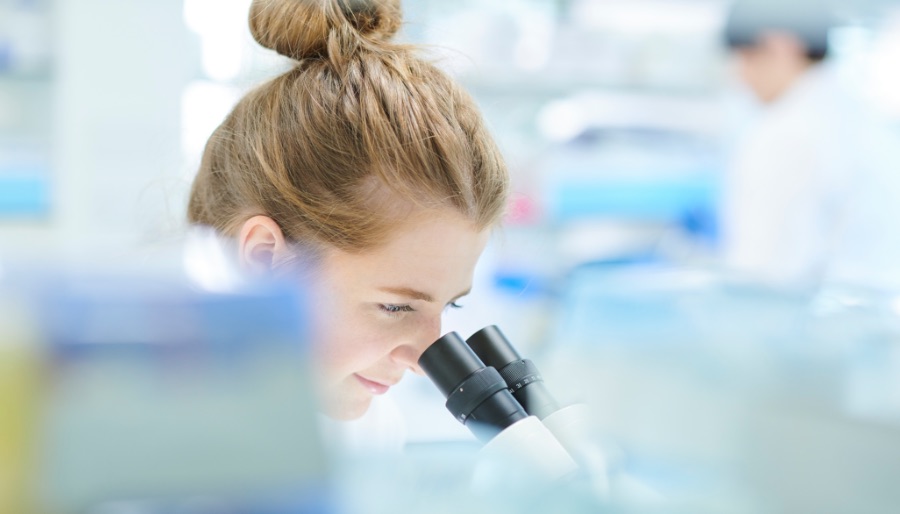Bifidobacterium infantis
(DSM 33361)
- a promising probiotic strain

In clinical studies, Bifidobacterium infantis (DSM 33361) has been associated with a reduction in the rate of necrotizing enterocolitis2,3
Chr. Hansen Bifidobacterium infantis (DSM 33361)
The Bifidobacterium infantis (DSM 33361) probiotic strain was isolated from the intestine of a healthy infant. Bifidobacterium infantis (DSM 33361) is safe for consumption; it has been granted QPS1 (Qualified Presumption of Safety) status in Europe. It has been used since the early 1990’ies as an ingredient in food and food supplements.
Bifidobacterium infantis (DSM 33361) has been associated with beneficial effects in preterm infants
Bifidobacterium infantis (DSM 33361) has been investigated in preterm infants in two high-quality clinical studies. The strain was investigated as part of a specific three-strain probiotic blend. The results suggest that Bifidobacterium infantis (DSM 33361) may help address necrotizing enterocolitis (NEC) issues in preterm infants.
The two clinical studies involved more than 1,200 preterm infants and the data suggest that a specific combination of the Bifidobacterium animalis subsp. lactis, BB-12®, Streptococcus thermophilus, TH-4® and Bifidobacterium infantis (DSM 33361) probiotic strains may help reduce the risk of NEC by up to 50%.2,3

The development of a healthy infant gut microbiome may be supported by a promising probiotic strain
Human milk oligosaccharides (HMO) are complex carbohydrates that are present in large amounts in human breast milk.4 HMOs cannot be metabolized by the majority of bacteria in the infant gut due to a lack of the required enzymes. As opposed to this, all Bifidobacterium infantis strains have a range of the right transporters and enzymes to metabolize HMOs, meaning that a combination of HMOs and a Bifidobacterium infantis strain might help increase the bifidobacterial colonization, which may have a long term, beneficial effect on the baby’s health.5,6 The Bifidobacterium infantis (DSM 33361) probiotic strain in combination with other well-documented probiotic infant strains, such as Bifidobacterium animalis subsp. lactis, BB-12® or Lactobacillus rhamnosus, LGG®, may be useful for supporting good infant development.
Click to read more about the importance of bifidobacteria for a healthy infant gut microbiome.
In partnership with Abbott Nutrition Health Institute, we have developed three podcast episodes in which we discuss probiotics and preterm infants. This podcast series covers topics such as Chr. Hansen-produced probiotics and their demonstrated mode of action. Click here to listen to the podcast series.
BB-12®, LGG® and TH-4® are registered trademarks of Chr. Hansen A/S
The article is provided for informational purposes regarding probiotics and is not meant to suggest that any substance referenced in the article is intended to diagnose, cure, mitigate, treat, or prevent any disease.
At Chr. Hansen, our strains are backed by science. All of our probiotic strains are supported by clinical documentation. Learn more about the beneficial effects our strains have on different health areas.
References Open Close
1. European Food Safety Authority (EFSA). EFSA journal 2012; 10(12):3020
2. Jacobs SE, et al. Probiotic effects on late-onset sepsis in very preterm infants: a randomized controlled trial. Pediatrics. 2013;132(6):1055-62. (PubMed)
3. Bin-Nun A, et al. Oral probiotics prevent necrotizing enterocolitis in very low birth weight neonates. J Pediatr. 2005;147(2):192-6. (PubMed)
4. Kunz C, et al. Oligosaccharides in human milk: structural, functional, and metabolic aspects. Annu Rev Nutr. 2000;20:699–722. (PubMed)
5. LoCascio, R.G.; Desai, P.; Sela, D.A.; Weimer, B.; Mills, D.A. Broad conservation of milk utilization genes in Bifidobacterium longum subsp. infantis as revealed by comparative genomic hybridization. Appl. Environ. Microbiol. 2010, 76, 7373–7381
6. Walker WA. The importance of appropriate initial bacterial colonization of the intestine in newborn, child, and adult health. Pediatr Res. 2017;82(3):387-95. (PubMed)
Clinical
studies
Learn how to review the evidence when considering probiotic strains and effects
Our
strains
Read more about some of the world’s most documented probiotic strains and their diverse, beneficial health effects



